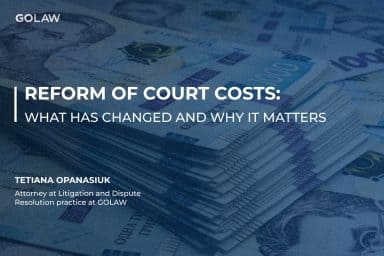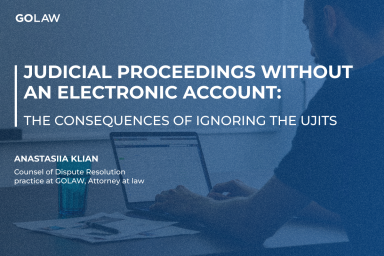Agreements which require approval under the new Law on LLCs
After the new Law on LLCs came into force, counterparties are more and more frequently requesting certificate on amount of net assets and copy of a decision of general meeting of shareholders on approval of significant transactions besides copies of constituent documents on the stage of preparation to conclude an agreement. It is directly connected with introduction by the Law of a new kind of transactions which have to be approved by shareholders of the company in order to be deemed valid.
After the new Law on LLCs came into force, counterparties are more and more frequently requesting certificate on amount of net assets and copy of a decision of general meeting of shareholders on approval of significant transactions besides copies of constituent documents on the stage of preparation to conclude an agreement. It is directly connected with introduction by the Law of a new kind of transactions which have to be approved by shareholders of the company in order to be deemed valid.
The new Law on LLCs highlights two types of transactions regarding which a special procedure of approval can be established by the charter:
- significant transactions;
- related-party transactions.
Significant transaction is a transaction made by the company, according to which the value of property (works, services or property rights), being its subject, in relation to value of the net assets of the company by the end of the previous quarter exceeds the amount specified by the charter or law. Besides that the Law provides a possibility for shareholders to establish in the charter other criteria of considering transactions of the company as significant.
To avoid misunderstandings legislator has also specified that in case when instead of several transactions company could have made one significant transaction, each such transaction will be considered as significant.
Related-party transaction is a transaction, which is carried out between the company and one of the following persons:
- official of the company or its affiliated person;
- shareholder who solely or jointly with affiliated persons owns a share that constitutes 20 % of the charter capital of the company or its affiliated persons;
- legal entity, in which any of the listed above persons is a member of the Company’s body;
- any other person directly indicated in the charter.
For the purposes of determination of related-party transactions affiliated persons are considered to be:
- legal entities under the condition that one of them holds control over the other or both of them are under control of the same third person;
- members of the family of an individual – husband (wife), parents (adoptive parents), caretakers (guardians), brothers, sisters, children and their husbands (wives);
- an individual and members of his family and a legal entity if such individual and/or members of his family hold control over such legal entity.
The Law includes provisions on determination of significant and related-party transaction but at the same time provides shareholders with the right to specify in the charter additional criteria of such transactions.
Determination in the charter of criteria according to which a transaction can be considered as significant or related-party as well as implementation of the procedure for approval of specified transactions in general, is exclusively the right but not the obligation of shareholders. The only case when the Law provides obligatory approval of transaction by the General meeting of shareholders is carrying out of transaction if the value of the property, works or services being the subject of such transaction exceeds 50 % of the net assets value of the company by the end of the previous quarter.
The new Law on LLCs also allows shareholders to determine at their own discretion a specific procedure for approval of significant and related-party transactions, in particular, to indicate which body shall provide such approval. For example, the charter of the company may define that transactions shall be approved by the decision of the Supervisory board of the company if the value of the property (works, services or property rights) being the subject of such transactions exceeds 10 % of the net assets value of the company by the end of the previous quarter. Alternatively, a transaction may require approval by the decision of the General meeting of shareholders of the company if the value of the subject of such transaction exceeds 25 % of the net assets value of the company by the end of the previous quarter.
If the company has suffered damages caused by official’s violation (a signatory on behalf of the company) of the procedure of carrying out of significant or related-party transactions, such officials shall bear joint and several liability for damages caused to the company. This provision of the Law applies, among others, to situations when transactions regarding which the procedure of approval has been violated, were later deemed null and void. As a result of such annulment all payments under this transaction should be returned to counterparty in order to bring the parties back to the condition in which they were before carrying out this transaction.
In order to avoid such situations on practice, legislator introduced the possibility of further approval of transaction for which the procedure of approval was not followed. In such cases, after further (subsequent) approval of a transaction in the same manner as provided for the prior consent of its implementation, such transaction remains valid.
Sign up to be aware
New achievements are inspired by information. GO further, don’t miss out GOLAW news and legal alerts
Our expertise
-
- Antitrust and Competition
- Banking and Finance
- Compliance, Corporate Governance and Risk Management
- Corporate and M&A
- Criminal and White Collar Defence
- Defense in Anti-corruption procedures and regulations
- Labor and Employment
- Natural Resources and Environment
- Government Relations (GR)
- Insolvency and Corporate Recovery
- Intellectual property
- International trade
- Legal support of business and private Сlients in Germany
- Litigation and dispute resolution
- Private clients
- Real Estate and Construction
- Energy and Natural Resources
- Restructuring, Claims and Recoveries
- Martial Law
- Tax and Customs
-
- Agribusiness
- Aviation
- Chemical industry
- Engineering, Construction and Building Materials
- Natural Resources and Environment
- Financial institutions
- IT and AI
- Industry and manufacturing
- Healthcare industries, Life sciences and Pharmaceuticals
- Media, Entertainment, Sports and Gambling
- Retail, FMCG and E-Commerce
- Transport and Logistics
We use cookies to improve performance of our website and your user experience.
Cookies policy
Cookies settings







